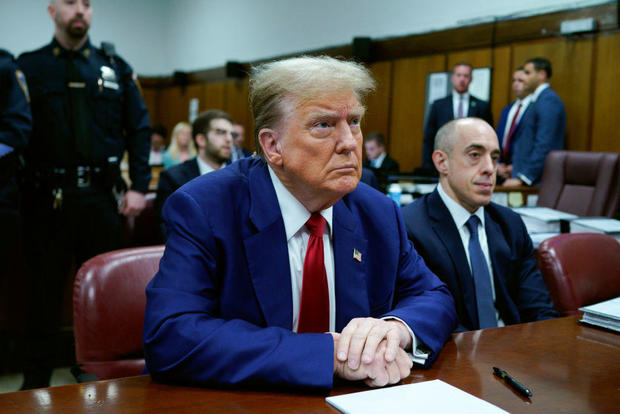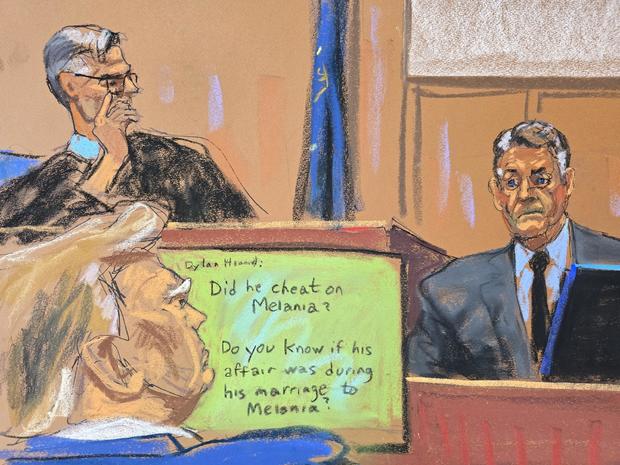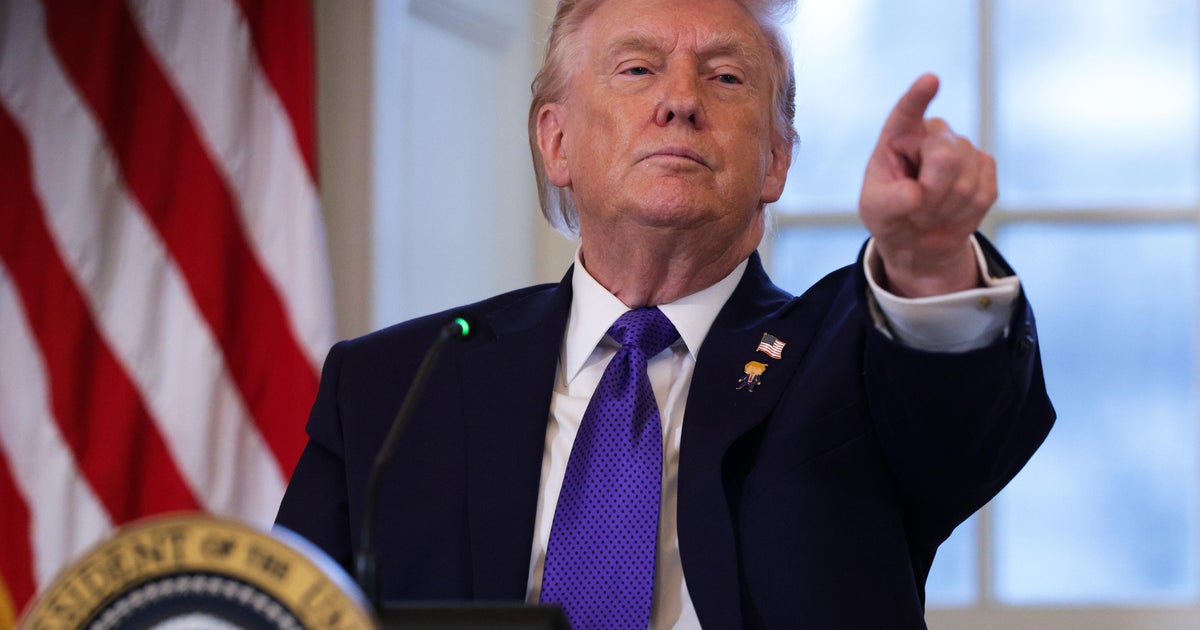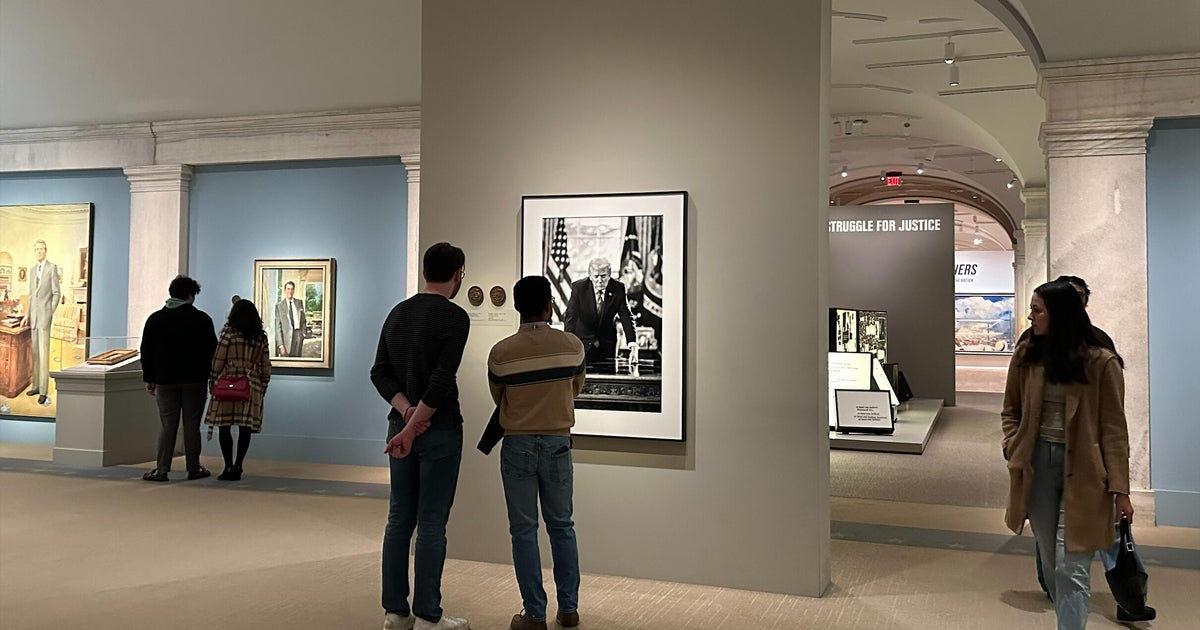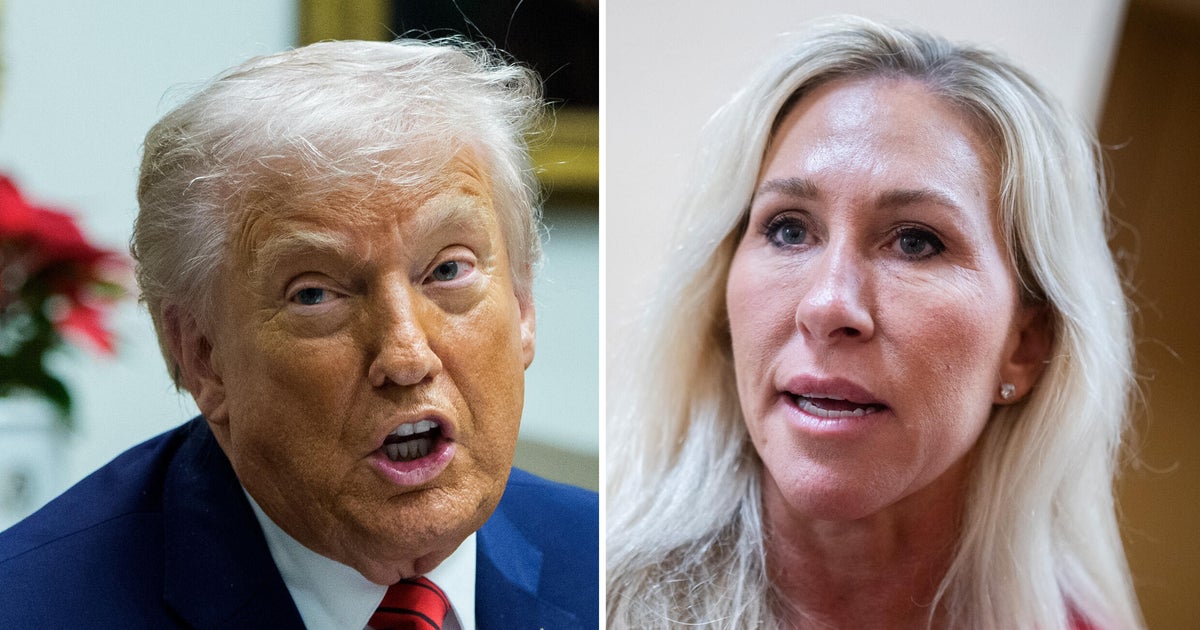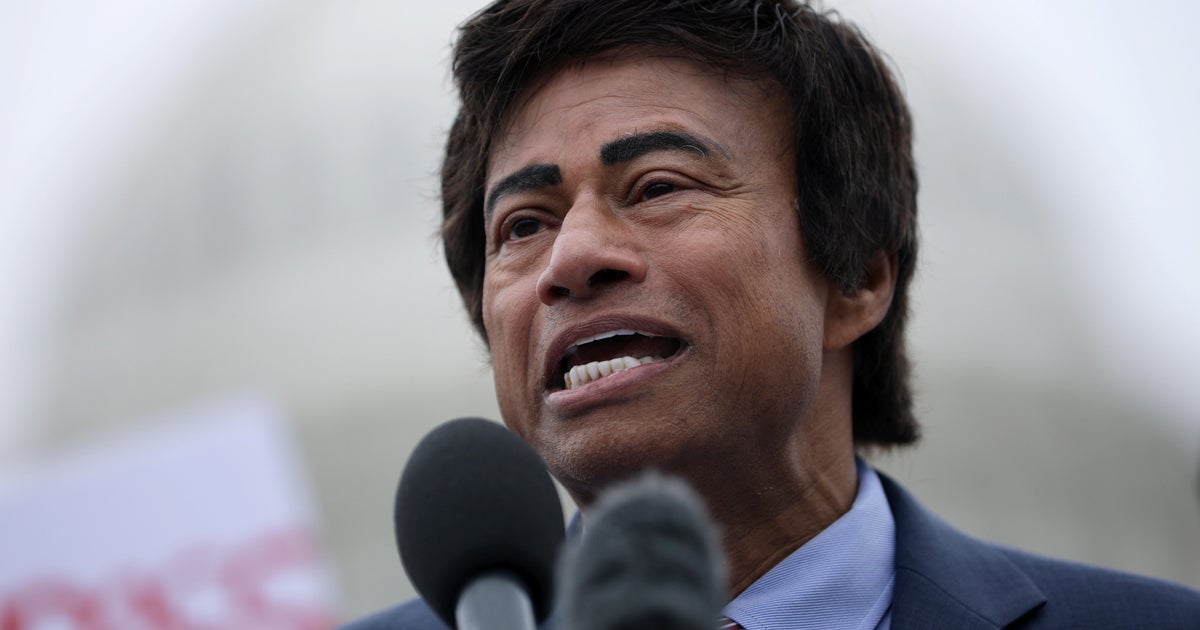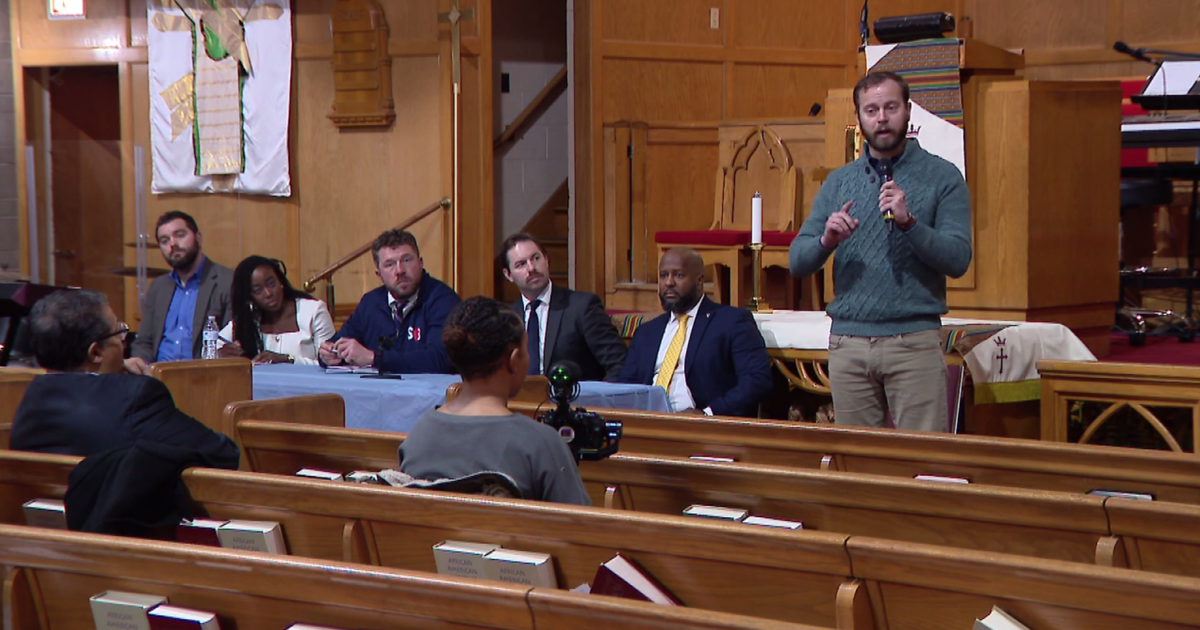Trump trial hears testimony from Keith Davidson, lawyer who represented Stormy Daniels and Karen McDougal
Jurors in former President Donald Trump's criminal trial in New York heard testimony Tuesday from Keith Davidson, an attorney who represented two women who claimed in 2016 that they had sex with Trump and were paid for their silence.
Davidson recounted negotiations in the months leading up to the 2016 election over deals for both women. McDougal, a former Playboy model, ultimately received $150,000 from the parent company of the National Enquirer in exchange for the rights to her story. Daniels received $150,000 from Michael Cohen, Trump's personal attorney at the time, just days before voters went to the polls.
Trump denies the women's claims and has pleaded not guilty to 34 felony counts of falsification of business records related to reimbursements to Cohen for the Daniels payment. Prosecutors allege he concealed the true nature of the reimbursements to cover up the "hush money" payment.
On the stand Tuesday, Davidson walked the court through months of text messages, emails and phone calls he exchanged with Cohen and Dylan Howard, the editor of the Enquirer.
The Karen McDougal payment
Under questioning from prosecutor Joshua Steinglass, with Trump looking on from the defense table, Davidson said he and Howard were "professional acquaintances and friends," and that they would speak several times a week in 2016.
Davidson said he represented McDougal beginning that June regarding the "personal interaction she had … with Donald Trump." Prosecutors displayed texts and emails that Davidson produced pursuant to a subpoena.
Soon after agreeing to represent McDougal, Davidson texted Howard that he had a "blockbuster" story about Trump. Howard responded that he would "get you more than ANYONE for it. You know why…"
"I don't know if I had a clear understanding at that time, but I knew that Dylan's boss at that time, David Pecker, and Mr. Trump were longtime friends and had a business relationship," Davidson said on the stand. "And AMI had announced explicitly that they endorsed Mr. Trump's candidacy."
He said he met with Howard soon after and kept in touch over the following weeks. He testified that he was also talking to ABC about McDougal's story, and was "trying to play two entities off each other."
Prosecutors showed a text from Davidson in July 2016 that read: "Don't forget about Cohen. Time is of the essence. The girl is being cornered by the estrogen mafia." He said on the stand that the text was "regrettable," and that the phrase "is not one that I use or came up with."
Other texts showed Davidson negotiating through Howard, seeking a deal from AMI. He said he thought the outlet was a better fit, since the company wouldn't require McDougal to tell her story.
Davidson indicated he understood that a deal with AMI would also benefit Trump for the same reason: McDougal's silence.
"Throw in an ambassadorship for me. I'm thinking Isle of Man," he texted Howard, referring to a self-governing British Crown dependency.
Asked by a prosecutor to explain what he meant by that text, Davidson replied, "That somehow if Karen did this deal with AMI that it would help Donald Trump's candidacy."
He added that he didn't specifically know that AMI had struck a deal with Trump, but understood it to be supportive of his candidacy.
"I need this to happen," Howard later texted Davidson.
McDougal ultimately received $150,000 in exchange for the rights to her story, which the Enquirer never published. Davidson said his cut of the payment was 45%.
The Stormy Daniels payment
The prosecution moved on to questions about Davidson's involvement in talks over Daniels' story. Negotiations ramped up in October 2016 after the release of the infamous "Access Hollywood" video.
Trump's eyes were closed and he frowned deeply as Davidson spoke. His son Eric was seated behind him.
When the "Access Hollywood" video emerged, Davidson texted Howard an expletive: "Trump is f--ked." Howard responded: "wave the white flag, it's over people!"
Davidson testified that Gina Rodriguez, a talent agent who worked with Daniels, went directly to Howard trying to sell her client's account. "I had nothing to do with that deal," Davidson said, referring to a potential agreement with AMI. "I believe they came to terms."
Davidson said AMI had agreed to purchase Daniels' story for $120,000, but the company backed out and the deal fell apart. Howard asked Rodriguez to call Cohen and finish the deal with him. She refused. Davidson also declined before Howard convinced him to reach out.
"The moral of the story is no one wanted to talk to Cohen," said Davidson.
When Davidson got involved, he said the price increased to $130,000. He padded the deal so he could get compensated, and said Cohen "stepped into AMI's shoes."
After an agreement, Cohen delayed sending the payment and continued to be evasive. "I called him and said, 'Michael, this is a very bad situation. I have a client and her rep, Gina, who is very upset. It's making me look bad and I don't believe, really, a word that you say.'"
Cohen replied, according to Davidson: "Well, goddamn it, what do you expect me to do? My guy is in five different states today. There's nothing I can do. I'm doing everything I can." Davidson understood "my guy" to be Trump.
Ultimately, Davidson said that Cohen stated, "Goddamn it, I'll just do it myself.""
When the payment still hadn't been received by Oct. 17, Davidson sent an email to Cohen saying the deal was off and the settlement canceled. "Please further be advised that I no longer represent her in this or any matter," he wrote.
Davidson said he didn't want to be involved anymore or get more calls from Cohen. Steinglass asked Davidson what he thought was happening with the delayed payment.
"I thought he was trying to kick the can down the road until after the election," he said.
But the relationship, marred by mistrust, continued. Davidson described a renewed effort to get the deal done in the following weeks. His testimony Tuesday ended with an exchange from Oct. 26 that exemplified his skepticism of Cohen. It was the day before Cohen transferred the $130,000.
Davidson testified Cohen called him that day and said he was sending the money.
"I told him that I didn't believe him, and he forwarded this email to me," Davidson said, as prosecutors showed a message from Cohen's Trump Organization email account saying funds had been deposited into Cohen's First Republic Bank account.
Davidson said the email meant nothing to him.
"He forwarded me an email saying he had the money but he didn't send the money to me," Davidson said.
The next day, Cohen used a newly established LLC to wire the money to an account associated with Davidson. Cohen received a copy of the agreement signed by Daniels several days later.
Earlier in the day Tuesday, Gary Farro, Cohen's former banker, testified about a series of harried emails and phone calls from Cohen as he worked to set up the new bank account. He funded it with $131,000 from his own personal home equity line of credit on Oct. 26.
Cohen had described the account and transaction as related to real estate consulting, Farro testified, reiterating that the request was "urgent."
Farro said the transfer would have been delayed if Cohen indicated the transfer involved either a political candidate or an adult film star. He said any transaction involving a political candidate would have received "additional scrutiny" to ensure it was legal.
But he offered a different explanation of why the bank would have scrutinized a payment to Daniels. He said the bank was wary of facilitating the adult film industry.
"For something like that, we might have considered that a reputational risk," Farro said.
Trump's contempt order
Judge Juan Merchan began the day by giving Trump good and bad news. He approved a request by Trump to adjourn court on May 17 so he can attend his son's high school graduation. But then he issued a ruling that prosecutors have sought for more than a week. Merchan found Trump in contempt of court for violating a gag order limiting what he can say about those involved in the case.
Merchan said Trump violated the order nine times in recent weeks in posts on his Truth Social platform and campaign website. He fined Trump $9,000 and ordered him to delete the posts. He noted in his written ruling that New York law doesn't allow him to impose a fine of more than $1,000 per violation, and said that amount might not dissuade future violations by defendants who can afford to pay the fine.
Merchan concluded the written ruling with a warning to Trump: "Defendant is hereby warned that the Court will not tolerate continued willful violations of its lawful orders and that if necessary and appropriate under the circumstances, it will impose an incarceratory punishment."
The posts were deleted from Trump's Truth Social account and campaign website by the afternoon.
